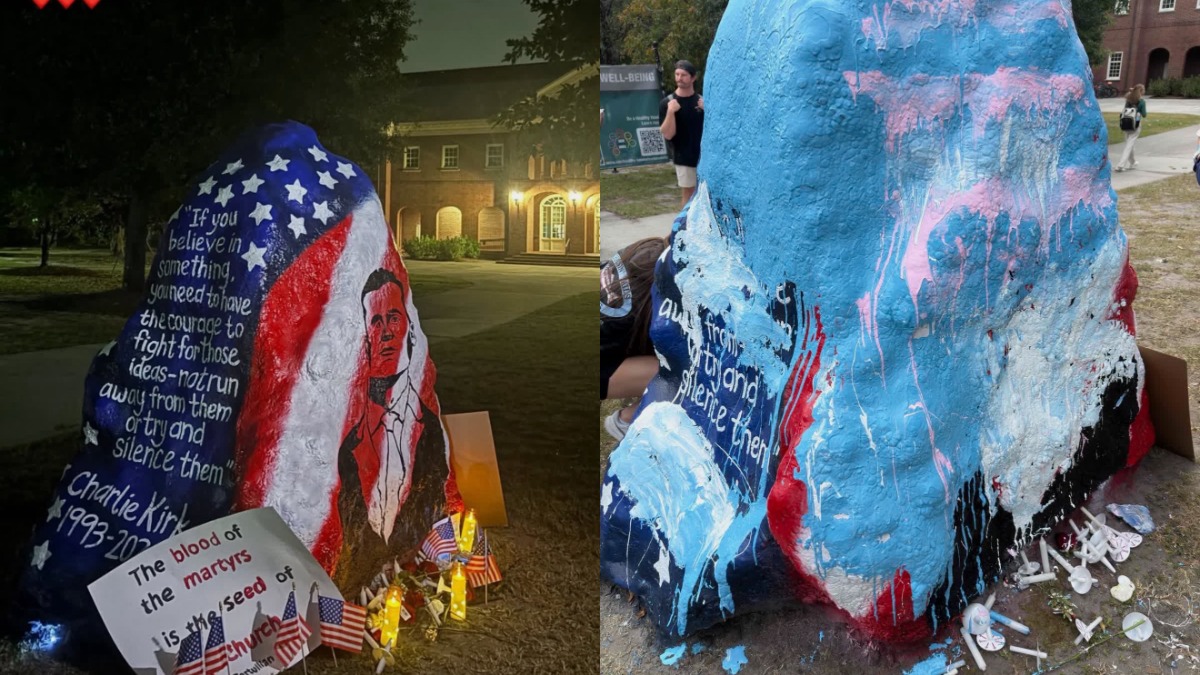The University of North Carolina at Wilmington (UNC Wilmington) is at the center of national attention after a shocking act of vandalism. A memorial rock dedicated to Charlie Kirk, a conservative activist whose name has been associated with free speech advocacy, was recently defaced.
According to reports and social media posts, far-left extremists allegedly painted over the memorial, sparking a wave of outrage across the country. For many, this act represents not only disrespect toward Kirk’s memory but also a broader attack on free speech and the right to hold opposing views.
The Memorial and Its Meaning
The rock at UNC Wilmington was decorated with patriotic imagery, including the American flag, flowers, and quotes about freedom and expression. Students and supporters had used it as a symbol to honor Kirk’s commitment to speaking out on controversial topics.
However, within days, the memorial was covered with paint and graffiti, erasing the tributes and leaving behind what many saw as a deliberate attempt to silence conservative voices on campus.
Reaction to the Vandalism
News of the vandalism spread quickly online. Images of the before-and-after transformation of the rock went viral, showing the stark difference between the tribute and the defacement.
Supporters expressed anger, calling the act a clear sign of intolerance. “This is exactly why freedom of speech is under threat,” one commenter wrote on social media. Others argued that regardless of political affiliation, memorials should be respected as spaces of remembrance and dialogue.
On the other hand, critics of Kirk’s views said the incident highlighted ongoing tensions between conservative and progressive movements on college campuses.
The Broader Issue: Free Speech on Campus
The UNC Wilmington incident is part of a larger debate in America: the role of free speech in higher education. Over the past decade, campuses across the country have become battlegrounds for political expression, with conservative speakers often facing protests, disruptions, or cancellations.
Supporters of Kirk argue that vandalizing a memorial is not only an attack on one individual but also a symbolic rejection of open debate. They say universities should encourage dialogue instead of hostility, ensuring that all viewpoints are heard without fear of censorship.
Political and Social Implications
The act has quickly turned into a political flashpoint. Conservative commentators have pointed to the vandalism as proof that far-left groups are willing to destroy symbols of free expression to silence opposition.
At the same time, progressive voices counter that honoring controversial figures only deepens political divides. They argue that freedom of speech should not be used to justify speech they consider harmful or discriminatory.
This clash illustrates the deep polarization in American society, where even a painted rock can become a symbol of national debate.
Calls for Action
In the wake of the incident, students, faculty, and local officials have called for accountability. Some demand stricter campus security to protect memorials and symbolic spaces. Others urge UNC Wilmington’s leadership to reaffirm its commitment to protecting free speech for all students, regardless of political ideology.
The incident also raises questions about how universities should balance freedom of expression with the responsibility to maintain respectful environments for students of all backgrounds.
The vandalism of the Charlie Kirk memorial rock at UNC Wilmington is more than just an act of property damage—it is a reflection of the intense cultural and political battles playing out across America. For many, it highlights the fragility of free speech in today’s polarized climate.
Whether one agrees with Kirk’s views or not, the incident underscores the importance of protecting spaces for dialogue and expression. As the debate continues, the rock at UNC Wilmington stands as a powerful symbol of both division and the urgent need to preserve the values of free speech.


